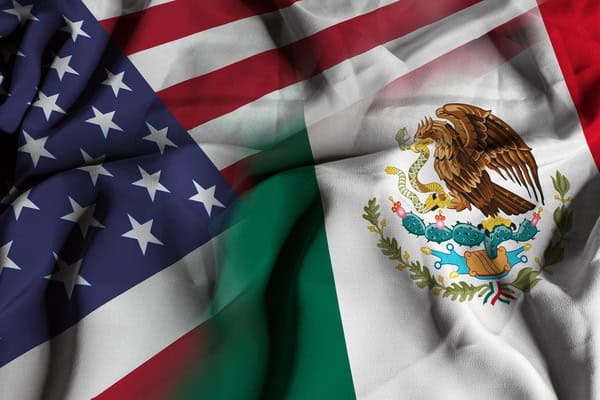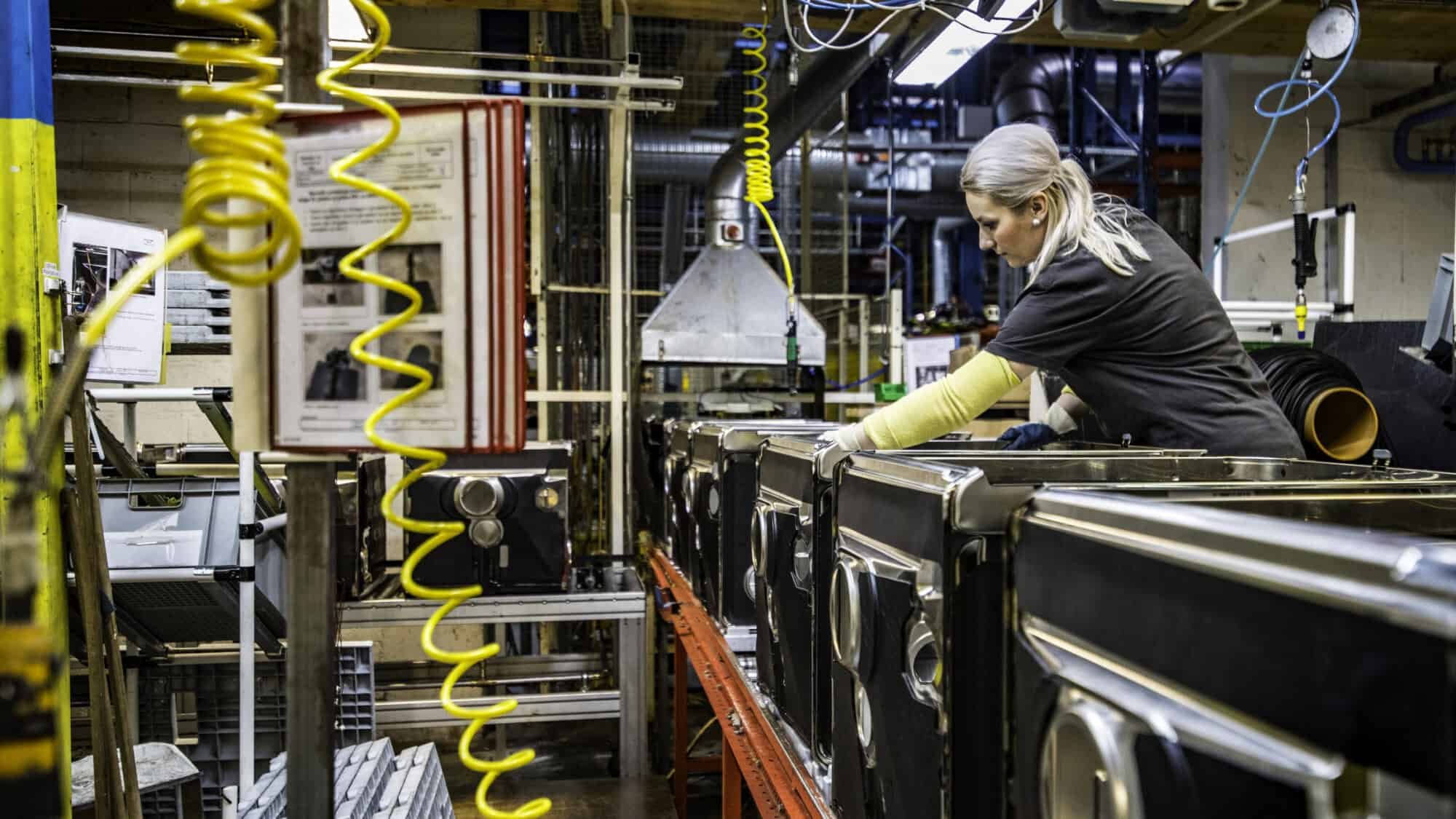Manufacturers Need 301 Exclusions Process to Compete Globally
De Minimis Rule Risks Throttling U.S. Supply Chains at Ports of Entry
Washington, D.C. – Following the U.S. Trade Representative’s announcement on the continuation of Section 301 tariffs on China and the White House’s announcement on de minimis, National Association of Manufacturers Vice President of International Policy Andrea Durkin released the following statement:
“A trade war never benefits anyone, and this announcement ignores the realities of today’s economy, potentially harming manufacturers’ ability to grow and invest in the U.S. Manufacturers operate in a rapidly shifting global economy, where tariffs have the potential to affect every industry and every product. To stay competitive, manufacturers must have the flexibility to apply for exclusions as market dynamics change. Without this process, companies of all sizes will be crippled by rigid policies that stifle growth and innovation.
“Raising the cost of critical clean energy inputs, without offering a process for exclusions, directly undermines the Biden administration’s goal of boosting clean energy manufacturing in the U.S. Policymakers must ask tough questions: Are we issuing permits for more domestic aluminum smelters and critical minerals refining for energy production applications? Will wafer and battery production be exempt from regulatory hurdles to ensure automotive and high-tech manufacturing is not slowed? The White House also announced today it will propose a rule significantly altering how goods enter our borders under de minimis, subjecting hundreds of millions of additional packages to scrutiny by CBP—which raises the question of how we will ensure that manufacturing supply chains are not disrupted by this massive new burden on the agency charged with protecting our ports of entry.
“These questions all point to one fact—that tariffs often fail to address the underlying problems they’re supposed to solve, while often complicating manufacturers’ efforts to improve the quality of life for everyone. We are asking the administration to implement an exclusion process that fairly accounts for the unintended consequences of tariffs on our industry’s ability to create jobs and reach the 95% of customers around the world.”
-NAM-
The National Association of Manufacturers is the largest manufacturing association in the United States, representing small and large manufacturers in every industrial sector and in all 50 states. Manufacturing employs nearly 13 million men and women, contributes $2.89 trillion to the U.S. economy annually and accounts for 53% of private-sector research and development. The NAM is the powerful voice of the manufacturing community and the leading advocate for a policy agenda that helps manufacturers compete in the global economy and create jobs across the United States. For more information about the NAM or to follow us on Twitter and Facebook, please visit www.nam.org.
Mexican Reforms Jeopardize U.S.–Mexico Trade

If enacted, the broad constitutional amendments being pushed by outgoing Mexican President Andrés Manuel López Obrador would put the special U.S.–Mexico trade relationship at serious risk, according to the NAM.
What’s going on: Last week, Obrador froze Mexico’s relationships with U.S. and Canadian embassies following concerns voiced by those countries’ ambassadors about the proposed reforms, which include sweeping changes to the Mexican judiciary and the elimination of several important state regulatory and oversight agencies.
- Mexico is America’s largest trading partner, with the volume of trade between the two nations coming in at $900 billion last year.
- Obrador’s proposed revisions led investment bank Morgan Stanley to issue an “effective ‘sell’ recommendation on Mexico” late last month (Reuters, subscription).
Why it’s a problem: “We’re concerned that some of the reforms as proposed could harm Mexico’s standing as an attractive place to do business,” NAM Vice President of International Policy Andrea Durkin said on the “Imagen Empresarial” (“Corporate Image”) podcast last week. “Manufacturers pay attention to how banks are factoring these potential changes to the constitution into Mexico’s risk profile.”
- Indeed, “[i]nvestors see independent judiciaries—sheltered from politics—as a sign of strong rule of law,” one emerging markets expert told The Wall Street Journal (subscription).
- Several planned revisions also appear to violate Mexico’s obligations under the U.S.–Mexico–Canada Agreement, which is due for review by all three nations in 2026. Moving forward with the reforms could jeopardize the continuation of that deal.
What’s next: Incoming Mexican President Claudia Sheinbaum, who takes office Oct. 1, “supports the judicial changes, but executing the overhaul might take up most of the energy of her new government, leaving her little bandwidth for her own agenda, which includes an expansion of social programs that need foreign investment,” according to the Journal.
Manufacturers Mourn Passing of Former Association Leader Dirk Van Dongen
Washington, D.C. – Following the passing of Dirk Van Dongen, the former CEO of the National Association of Wholesaler-Distributors, National Association of Manufacturers President and CEO Jay Timmons released the following statement:
“Dirk Van Dongen was a Washington legend. For nearly half a century, he led the NAW to be a powerful convener of the business community, advocating for policies that made manufacturing in America more competitive in a global economy. But he was far more than the leader of a single association. He was revered as a respected dean of the association CEO community. I feel enormously grateful to have considered him a mentor and friend and to have received a few coveted invitations to join him at his table at his favorite D.C. bistro, Equinox.
“Dirk believed wholeheartedly in the power of free enterprise to make life better for everyone. He fought for sound tax policy and many shared priorities to enhance the competitiveness of manufacturing, as part of a larger mission to grow our industry and the U.S. economy. His ability to work with both sides of the aisle and get things done distinguished him as a business leader. Over and over again, Dirk proved why associations are indispensable voices in our society.
“Dirk’s best life lesson that he imparted effortlessly was to be honest, direct, upfront and authentic. You never had to wonder where Dirk stood or what he believed was the right course of action.
“Our thoughts and prayers are with his beloved wife, Maryann, and his daughters Rachel and Marisa during this difficult time.”
-NAM-
The National Association of Manufacturers is the largest manufacturing association in the United States, representing small and large manufacturers in every industrial sector and in all 50 states. Manufacturing employs nearly 13 million men and women, contributes $2.89 trillion to the U.S. economy annually and accounts for 53% of private-sector research and development. The NAM is the powerful voice of the manufacturing community and the leading advocate for a policy agenda that helps manufacturers compete in the global economy and create jobs across the United States. For more information about the NAM or to follow us on Twitter and Facebook, please visit www.nam.org.
NAM Gets New International Policy Lead

Former Assistant U.S. Trade Representative for World Trade Organization and Multilateral Affairs Andrea Durkin has joined the NAM as vice president of international policy, the NAM announced Monday.
An experienced leader: “Andrea brings a wealth of expertise to the job, with more than three decades of service in both the public and private sectors,” NAM President and CEO Jay Timmons said. “As a leader in international trade negotiations, her deep understanding of international policy will enhance the NAM’s strategic objectives significantly as we continue to build off of successful engagements with our counterparts across Europe and the North American continent.”
- Durkin is a foremost U.S. expert on international policy, having worked in both Republican and Democratic presidential administrations. In her most recent role, at the USTR in the Executive Office of the President, she negotiated policy regarding issues before the WTO. She also led the operation of committees on technical barriers to trade, industrial subsidies, trade facilitation and more.
- Her negotiations credentials include free trade agreements in the Western Hemisphere and the trade-related portions of United Nations’ multilateral environment and public health agreements.
A teacher and an entrepreneur: An adjunct professor for 17 years, Durkin taught international trade and investment policy at Georgetown University’s Master of Science in Foreign Service program.
- She is also the founder of Sparkplug, LLC, a consulting firm that specialized in advising corporate affairs teams and think tank leaders on organizational strategy.
USTR’s WTO Lead Andrea Durkin to Lead NAM International Policy Team
NAM Advocates Global Trade Strategy That Will Open New Markets with Our Allies and Create Vast Opportunities for Manufacturers in the U.S.
Washington, D.C. – The National Association of Manufacturers announced that former Assistant U.S. Trade Representative for WTO and Multilateral Affairs Andrea Durkin is joining the NAM as the new vice president of international policy.
“Andrea brings a wealth of expertise to the job, with more than three decades of service in both the public and private sectors. As a leader in international trade negotiations, her deep understanding of international policy will enhance the NAM’s strategic objectives significantly as we continue to build off of successful engagements with our counterparts across Europe and the North American continent,” said NAM President and CEO Jay Timmons.
“As manufacturers in America look for new ways to reach global markets and the 95% of customers that live outside the borders of the United States, Andrea is set to lead an ambitious expansion of the NAM’s international policy operation. She will work to uphold our commitment to shaping a global trade strategy that opens new markets with our allies and trading partners around the world, which, in turn, will create vast opportunities for manufacturers in the U.S. to create well-paying jobs, innovate and achieve new milestones in improving the quality of life for everyone.”
Durkin is one of the nation’s foremost experts on international policy, drawing from decades of experience serving in Democratic and Republican administrations. As a senior executive in the Office of the President, she led trade negotiations and U.S. policy at the WTO and was responsible for committees on industrial subsidies, technical barriers to trade, government procurement, trade facilitation, customs and others. She was also the U.S. senior official for the Organization for Economic Co-operation and Development Trade Committee, G7 and G20 trade tracks.
In years prior, Durkin served in the U.S. Department of Commerce’s International Trade Administration, where she led a variety of negotiations, including free trade agreements in the Western Hemisphere, sectoral initiatives in the Asia-Pacific Economic Cooperation and trade-related aspects of United Nations’ multilateral environment and public health agreements.
-NAM-
The National Association of Manufacturers is the largest manufacturing association in the United States, representing small and large manufacturers in every industrial sector and in all 50 states. Manufacturing employs nearly 13 million men and women, contributes $2.89 trillion to the U.S. economy annually and accounts for 53% of private-sector research and development. The NAM is the powerful voice of the manufacturing community and the leading advocate for a policy agenda that helps manufacturers compete in the global economy and create jobs across the United States. For more information about the NAM or to follow us on Twitter and Facebook, please visit www.nam.org.
NAM Urges Passage of New MTB Bill

The House should move quickly to pass the Miscellaneous Tariff Bill Reform Act, legislation on which the NAM has led advocacy efforts.
What’s going on: On Tuesday, House Ways and Means Trade Subcommittee Chairman Adrian Smith (R-NE) introduced the Miscellaneous Tariff Bill Reform Act, which seeks to renew the MTB—a manufacturing-critical law that temporarily removes or reduces tariffs on products not available in the U.S.—as soon as possible.
- The NAM, which has long urged Congress to take up the issue, lauded the legislation and called for its swift passage.
- “Historically, the MTB has always had bipartisan support, and we thank House Ways and Means Trade Subcommittee Chairman Adrian Smith for his leadership and efforts to introduce MTB legislation,” said NAM Managing Vice President of Policy Chris Netram in a statement cited by Chairman Smith’s office. “We urge the House to act quickly so that we can get one step closer to getting this critical legislation to President Biden’s desk.”
- The last MTB expired in December 2020.
Why it’s important: In the three-and-a-half years that they have been operating without an MTB, manufacturers and other businesses in the U.S. have paid more than $1.3 million a day to get inputs they cannot find in the U.S., according to an NAM analysis.
- Passing the MTB through 2026, on the other hand, and reauthorizing passage of future MTB cycles will boost U.S. competitiveness.
- Tariff relief under the previous MTB increased U.S. gross domestic product by up to $3.3 billion every year, according to the U.S. International Trade Commission.
NAM: Manufacturers Need a Better Section 301 Exclusion Process

To thrive, create jobs and produce the essential goods the U.S. and our trading partners use every day, the manufacturing sector needs a fair, transparent Section 301 tariff exclusion process, the NAM said Tuesday.
- However, the tariff increases announced this week by the Biden administration could make it much more difficult for manufacturers to produce those critical items.
What’s going on: As part of the U.S. Trade Representative Office’s final Section 301 tariffs review—which the NAM had long urged the office to complete—President Biden said his administration plans to raise “tariffs on Chinese electric vehicles to roughly 100% … increas[e] a key tariff rate on steel and aluminum products to 25% from 7.5%,” raise the solar-cell tariff to 50% from 25% and create a new 25% duty on shipping cranes, according to Reuters (subscription).
- Section 301 of the Trade Act of 1974 authorizes the U.S. to act against foreign trade practices it believes violate agreements. The NAM has been pushing for a finalized report with a fair, transparent Section 301 tariff exclusion process that will both reduce the burden on manufacturers and keep pressure on China to adhere to fair practices.
- The process would allow manufacturers to ask for tariff exclusions for specific products they need.
- “The NAM has long advocated for a full global strategy and a rules-based trading system that benefit manufacturers and workers by opening new markets with our allies,” NAM President and CEO Jay Timmons said.
Why it’s important: Far from freeing the U.S. of “unacceptable risks” stemming from unfair Chinese trade practices, in the absence of a new exclusion process, these tariff increases could limit the ability of manufacturers in the U.S. to obtain needed supplies for goods production.
- This, in turn, could jeopardize U.S. jobs and competitiveness.
- “Manufacturers are concerned about the potential impact this broad swath of tariffs could have on our ability to produce the essential products needed to drive our economy forward, especially if critical inputs become less available and more costly,” said Timmons.
The background: The USTR is legally required to review Section 301 tariffs four years after they are initiated. This most recent review—started in May 2022—is overdue.
- The exclusion process the NAM has long requested allows manufacturers to ask for tariff exclusions for specific products they need.
What should be done: “Manufacturers urge the administration to negotiate new trade agreements with allies and partners around the world and create a new, comprehensive and transparent 301 exclusion process to ensure that manufacturing in America is not being disadvantaged by our own government,” Timmons concluded.
Restoring MTB Will Strengthen Manufacturing
For More Than Three Years, Manufacturers Have Been Paying Millions of Dollars in Higher Prices for Critical Inputs
Washington, D.C. – Following the introduction of the Miscellaneous Tariff Bill Reform Act, National Association of Manufacturers Managing Vice President of Policy Chris Netram released the following statement:
“For more than three years, manufacturers—particularly small and medium-sized manufacturers—have been paying millions of dollars in higher prices for critical inputs due to the expiration of the Miscellaneous Tariff Bill. This legislation is a significant step forward for manufacturers, which are losing more than $1.3 million every day on products not available in the U.S.—more than $1.5 billion overall.
“Restoring the MTB would strengthen manufacturing here at home, giving our sector the ability to source raw materials and components that can’t be produced domestically at scale or at competitive prices.
“Historically, the MTB has always had bipartisan support, and we thank House Ways and Means Trade Subcommittee Chairman Adrian Smith for his leadership and efforts to introduce MTB legislation. We urge the House to act quickly so that we can get one step closer to getting this critical legislation to President Biden’s desk.”
-NAM-
The National Association of Manufacturers is the largest manufacturing association in the United States, representing small and large manufacturers in every industrial sector and in all 50 states. Manufacturing employs nearly 13 million men and women, contributes $2.89 trillion to the U.S. economy annually and accounts for 53% of private-sector research and development. The NAM is the powerful voice of the manufacturing community and the leading advocate for a policy agenda that helps manufacturers compete in the global economy and create jobs across the United States. For more information about the NAM or to follow us on Twitter and Facebook, please visit www.nam.org.
Manufacturers Call for Comprehensive, Transparent Section 301 Exclusion Process
Administration Must Pursue a Global Strategy To Open New Markets with Allies
Washington, D.C. – Following the Biden administration’s announcement of new 301 tariffs targeting Chinese products in sectors including electric vehicles, solar equipment, semiconductors, batteries, medical equipment and critical minerals, National Association of Manufacturers President and CEO Jay Timmons released the following statement:
“Manufacturers are concerned about the potential impact this broad swath of tariffs could have on our ability to produce the essential products needed to drive our economy forward, especially if critical inputs become less available and more costly.
“The NAM has long advocated for a full global strategy and a rules-based trading system that benefit manufacturers and workers by opening new markets with our allies. But when countries play by their own rules and create distortions, the U.S. should consider the use of all legislative and enforcement tools.
“The expansion of manufacturers’ global reach through a more open and more fair global trading environment has been pivotal to expanding U.S. industrial production to record levels, enabling businesses of all sizes to raise wages and create more high-skilled U.S. jobs. That is why manufacturers urge the administration to negotiate new trade agreements with allies and partners around the world and create a new, comprehensive and transparent 301 exclusion process to ensure that manufacturing in America is not being disadvantaged by our own government.
“Politicians and policymakers on both sides of the aisle need to understand that we can’t instantly reshape supply chains that took decades to build—especially the supply chains that bring us vital inputs and components essential to our everyday lives.
“Additionally, to fully unleash the power of manufacturing in the United States, policymakers must also ensure that America maintains a competitive tax and regulatory regime that allows manufacturers to ramp up domestic investment; streamline the permitting process so that new facilities and energy and infrastructure projects will not be held up by red tape; grow the manufacturing workforce; and protect innovation. Together, these policies will help manufacturers create jobs, grow wages and expand exports to the 95% of customers who reside outside of our border.”
-NAM-
The National Association of Manufacturers is the largest manufacturing association in the United States, representing small and large manufacturers in every industrial sector and in all 50 states. Manufacturing employs nearly 13 million men and women, contributes $2.89 trillion to the U.S. economy annually and accounts for 53% of private-sector research and development. The NAM is the powerful voice of the manufacturing community and the leading advocate for a policy agenda that helps manufacturers compete in the global economy and create jobs across the United States. For more information about the NAM or to follow us on Twitter and Facebook, please visit www.nam.org.
Trade, Investment Policy Can Promote Supply Chain Resilience for Manufacturers

The NAM told the Office of the United States Trade Representative this week that it must use existing trade and investment tools to promote supply chain resilience for manufacturers in the U.S.
What’s going on: “Manufacturers and workers in the U.S. need USTR to undertake a proactive and competitive trade and investment policy that opens markets, eliminates barriers, enables the sourcing of necessary inputs and creates opportunities for inbound and outbound investment,” the NAM said Monday.
- The suggestions were in response to a USTR call for comment on “strategies that [will] advance U.S. supply chain resilience” (Federal Register).
What should be done: While manufacturers appreciate engagement with partners through frameworks such as the Indo-Pacific Economic Framework and the Americas Partnership for Economic Prosperity, the NAM encourages the government to “aggressively pursue ambitious agreements that include market access and the true removal of barriers to economic engagement with our partners.” The USTR can help manufacturers by:
- Adjusting or eliminating “current tariffs on manufacturers and ensur[ing] they are applied in such a way that creates a competitive environment for manufacturing in the U.S.”;
- “Negotiating more high-quality, modernized trade agreements with foreign partners” to remove trade barriers and address discriminatory measures; and
- Enforcing on-the-books trade agreements “to ensure that our trading partners are playing by the rules.”
Why it’s important: The aforementioned actions (and others) by the USTR would create “a competitive environment for manufacturers in the U.S. to succeed,” the NAM said.
